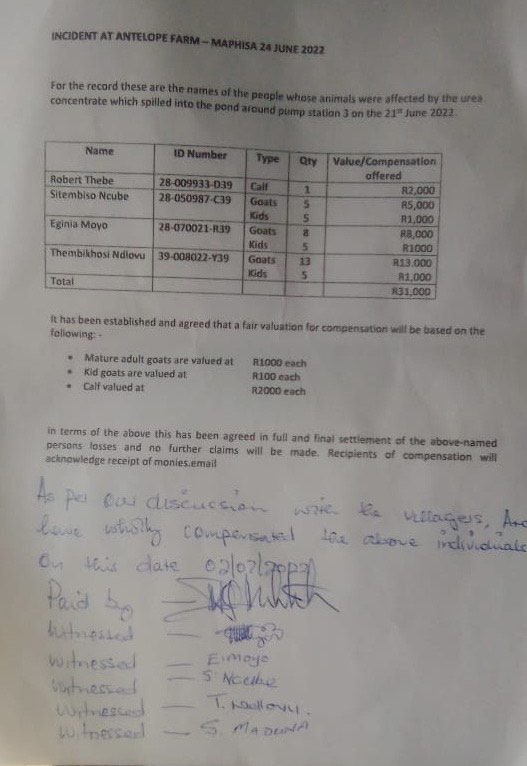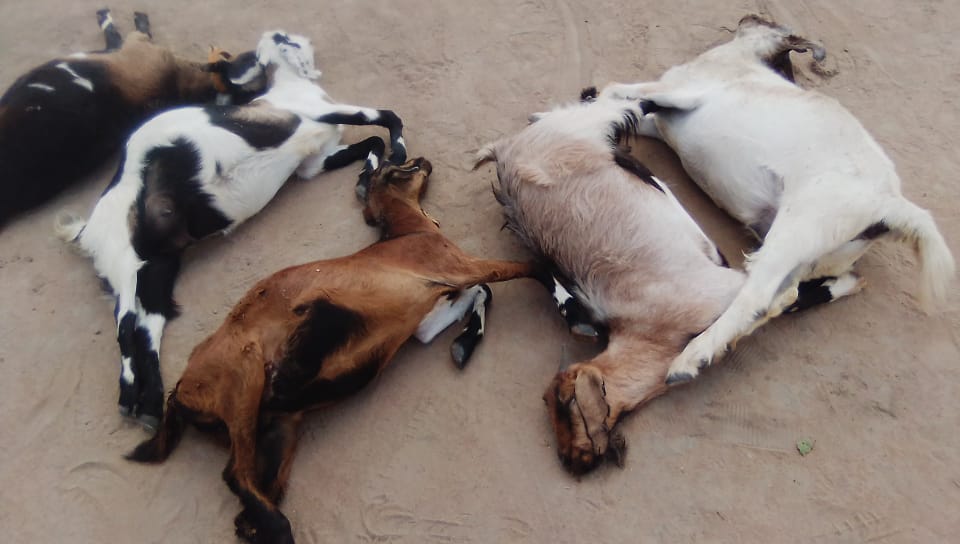The Agricultural Rural Development Authority (ARDA) estate at Antelope Farm has compensated villagers in Zwehamba Village in Ward 4 Matobo who lost their livestock that drank polluted water last week, CITE has heard.
The villagers lost more than 20 goats including kid goats and a calf after drinking urea concentrate, which had spilt into the pond around pump station 3 on June 21 2022.
The ARDA estate is run by a farmer, Dean Leroux, who agreed to compensate the affected villagers.
Read: https://cite.org.zw/arda-distances-itself-from-the-matobo-livestock-poisoning-saga/
For a fair valuation, compensation for a mature goat was valued at R1 000 each, a kid goat at R 100 each while a calf was R 2000 each.
In total, R31 000 was paid out to Robert Thebe, Sithembiso Ncube, Eginia Moyo and Thembinkosi Ndlovu.
Thebe had lost one calf, Ncube lost five goats and five kid goats, Moyo lost eight goats and five kid goats while Ndlovu lost 13 goats and five goat kids.

The Matabeleland Institute for Human Rights (MIHR), which had called on the Environmental Management Authority (EMA) to take remedial action against the ARDA Antelope Estate, welcomed the compensatory justice.
“We have received an update from the affected community in Matobo that the estate has compensated them for the loss of their livestock due to the agricultural poisoning. We do appreciate the action that has been taken by the company because this is a step towards community receiving compensatory justice,” said Khumbulani Maphosa, coordinator of MIHR.
MIHR is an organisation that advances human and environmental rights.
But Maphosa noted that livestock had more cultural value to villagers, something that monetary compensation could not replace.
“We want to put it across that business needs to understand that firstly they have an impact on the rights of people. When they do injustice, compensating people just for lost livestock is not the ultimate or final thing in terms of getting justice. As black people and Africans we have cultural dealings that we do,” he said.
“For instance, you find some people when they buy goats or cows do ceremonies to appease ancestral spirits and tell them they have purchased livestock, asking them to look after the animals. Now that your poison has killed the livestock, even though you are compensating to buy another one, it means villagers have to do another ceremony to tell the ancestors. Now the question is at whose cost will it be. Will you compensate for those cultural ceremonies?”
The MIHR coordinator urged companies not to dispose of poisonous chemicals or pollute the environment but take precautions to protect both land and livestock.
“As an organisation, we urge businesses to be very responsible, stop violating people and environmental rights. The business of dumping chemicals all over, polluting our environment, land and rivers is over because people are vigilant. They will monitor and report you to authorities to hold you accountable for business malpractices that violate the rights of people,” Maphosa said.
“Lastly, we encourage citizens especially in rural communities not to keep quiet whenever they come across environmental rights violations.”

